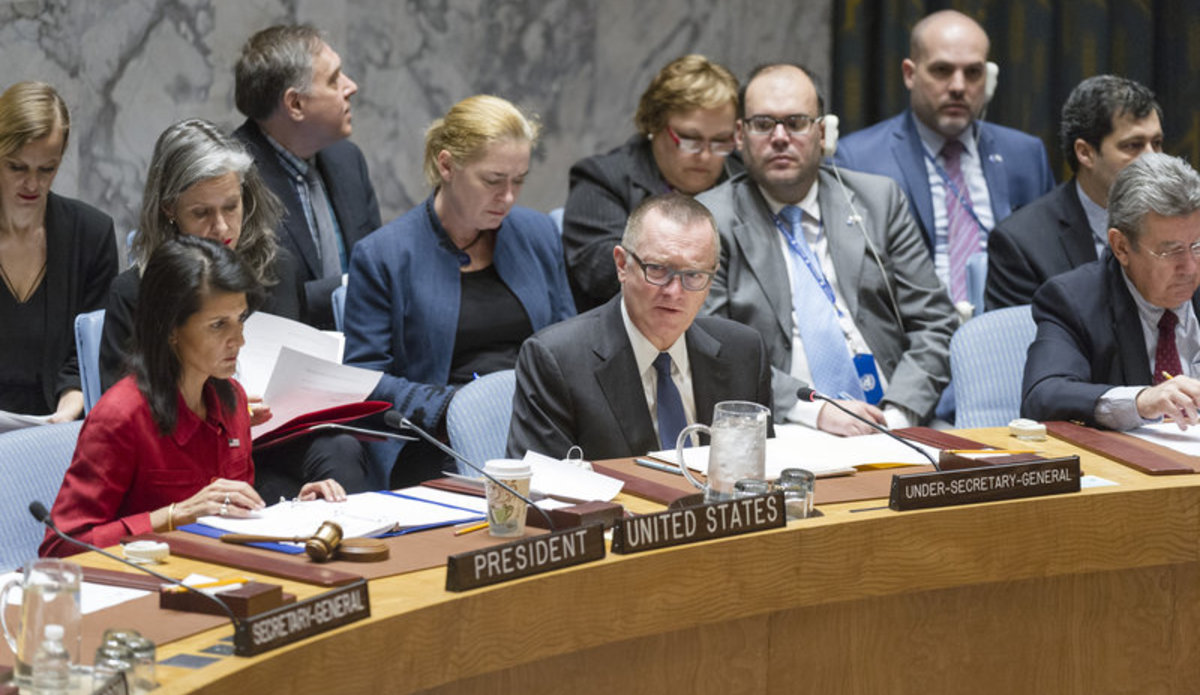Madame President,
The Council has requested the Secretariat to provide an update on Syria. In addition, Special Envoy for Syria, Staffan de Mistura will brief the Council in less than a week. I will therefore keep my remarks short.
Madame President,
In the last two months, we have seen the 30 December 2016 ceasefire falter, amid a steady escalation of military activity. In mid-February, Government forces escalated its their military operations in several areas of Damascus and Homs, recapturing Wadi Barada and al-Waar in Homs. Military advances there were accompanied by the large scale evacuation of fighters and their families. The Syrian Government cited the presence of the al-Nusra Front in these areas – claims disputed by the opposition. Subsequently, during February and March, armed opposition groups, sometimes coordinating with al-Nusra Front, launched offensives in Daraa, Damascus and Hama.
On 4 April, as government forces were fighting to regain territory recently lost to opposition offensives in northern Hama, disturbing reports emerged of an alleged chemical attack, in nearby Khan Shaykhoun in southern Idlib. Sources on the ground reported airstrikes. The attack was ostensibly the cause of a reported 86 deaths and more than 300 injuries. The Council discussed this in an emergency session on 5 April. The OPCW has announced that its Fact Finding Mission (FFM) is starting to investigate the alleged Khan Shaykoun attack. Earlier today, the Secretary-General, in a public statement, shared that he was abhorred by the chemical weapons attack in Khan Shaykhun, and the death and injury of many innocent civilians.
This morning at approximately 04:35 hours local time in Damascus - 7 April - two US naval vessels deployed in the eastern Mediterranean Sea launched a total of 59 cruise missiles targeting the Al-Shayrat military airbase in Homs Governorate. The United States has stated that this was in response to what it states was the Syrian government’s use of chemical weapons from this airbase. The US claimed that the missiles severely damaged or destroyed Syrian aircraft and support infrastructure and equipment. According to news reports, the US said that they had informed Russian Federation forces of the strike in advance, using the established de-confliction mechanism, and taking precautions to minimize risk to Russian or Syrian personnel located at the airfield.
A statement from the Syrian General Command of the Army and the Armed Forces called the attack a “blatant act of aggression” which had caused six deaths and “huge material damage.” Iran and the Russian Federation condemned the attack. The UK, Australia, Germany, Turkey, Saudi Arabia, Italy, Japan, the Netherlands and New Zealand have expressed some support for the strikes.
Madame President,
The Security Council has the primary responsibility for international peace and security. We hope the Council can unite and exercise that responsibility to investigate the alleged use of chemical weapons in Khan Shaykhun. It is important that this Council sends a strong collective message that any use of chemical weapons shall not be tolerated and will have consequences. The Secretary-General stresses that the international community has a responsibility to hold the any perpetrators of chemical weapons attacks accountable and to ensure that chemical weapons are never used again as an instrument of warfare.
The protection of civilians and accountability should be at the top of our peace and security agenda. In the case of Syria, there can be no genuine protection if parties to the conflict, Government and opposition, are permitted to act with impunity and if the Syrian Government continues to commit human rights violations against its own citizens. Protecting the Syrian people requires immediate action, action that is rooted in the principles of the United Nations and international law. Mindful of the risk of escalation, the Secrteary-General has publicly appealed for restraint to avoid any acts that could deepen the suffering of the Syrian people. We further urge all parties involved in military operations to abide by international humanitarian law and take all necessary precautions to avoid and minimize civilian casualties.
Madame President,
As the Secretary-General said today, these events underscore our belief that there is no other way to solve the conflict than through a political solution. We call on the parties to urgently renew their commitment to making progress in the Geneva talks. Security Council resolution 2254 (2015) and the Geneva Communiqué remain the foundation of, and contain the core principles for, United Nations mediation efforts in this regard.
Thank you, Madame President.

